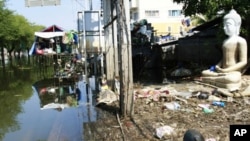In Thailand's capital, much of the city's attention is focused on keeping more water from flowing into the city's downtown. But there are also worries over the health risks posed by floating garbage, open sewage and toxic runoff from industrial estates and rice paddies from the north.
Sabong Suprang has been working as a trash collector in Bangkok for more than 10 years and says he likes his job because he makes the city cleaner.
Since the flood arrived in Bangkok, the 52-year-old has been working seven days a week. In Bangkok’s Phet Kasem district, where water has been waist-deep for a week, he is standing barefoot aboard a garbage truck, picking up waste with his bare hands, sometimes grimacing at the unbearable odor.
He says we normally collect trash every day when there is no flooding, but where there is flooding it’s really difficult to access the area for collection. He says there has been a lot of garbage since people evacuated, a lot of it has been left for weeks and smells very bad.
Bangkok authorities estimate the city normally produces 8,000 tons of waste daily, and trucks the garbage to one of three landfill sites. Two of those sites are now underwater. With fewer trash crews working, they now gather just 400 tons per day.
Deputy Bangkok Governor, Pornthep Techapaiboon says the city does not have enough boats for those workers who do still show up everyday.
“Collecting it now, this is the most difficult task because of the flooded area in this crisis, so we didn’t have enough task force because usually we have about 500 people in each district, but right now they are affected so about half of them come to work.”
The city typically employs some prisoners serving time for non-violent crimes who are willing to work for about $10 per day to collect trash. But the deputy governor says the convicts would rather build sandbag dikes instead of risking their health in the murky flood runoff.
“It’s rotten or smelly and polluted with very low oxygen content in the water, that’s all. But it’s no disease or other disease in there yet," he said. "If there is some contagious disease then it will spread very fast.”
Solid trash waste is not the only problem. Bangkok produces an estimated 30,000 tons of sewage each day, and authorities worry about health risks from overloaded sewers. A fertilizer plant capable of processing all of Bangkok’s waste is still unaffected by the flood, but most people living in flooded areas have no access to flushing toilets. The deputy governor says the task of disposing of human waste has also fallen to trash collectors.
“And then also we have been keeping a lot of mobile toilets and so-called comfort seats, with the black bag so they can leave their things in there and they tie it up and put it out and then we can send people to pick it up,” said Techapaiboon.
Besides reducing health risks, trash collectors are also helping to speed the flow of water out of the city. Flood monitors say keeping the city’s canals, drains and water pumps clear of debris is critical to speed the flow of flood runoff to the ocean, where much of the city’s waterlogged garbage will eventually end up.




